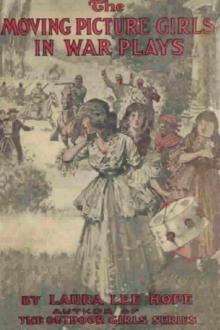An Island Story by H. E. Marshall (ebook pc reader .TXT) 📖

- Author: H. E. Marshall
- Performer: -
Book online «An Island Story by H. E. Marshall (ebook pc reader .TXT) 📖». Author H. E. Marshall
But Napoleon did not wait for them to come. He marched out to meet them, and a great battle took place on 18th June 1815 A.D. at Waterloo, not far from Brussels.
“Ah,” said Napoleon, “at last I shall measure swords with this Vilainton.” For although the French and British troops had often met, Napoleon had always been fighting elsewhere, and had never met Wellington in battle.
The fight was fierce and long, and as Wellington watched and directed, he anxiously looked for Bl�cher and his Prussians, who had promised to join and help him.
“Night or Bl�cher,” said Wellington, “night or Bl�cher,” for he knew that the coming of either would put an end to the dreadful fight. At last, about seven in the evening, Bl�cher and his Prussians came.
Then Napoleon made one more desperate struggle for victory. The soldiers of his Old Guard, who had been kept in reserve, were ordered forward, but they broke and fled before the British charge. Napoleon, as he watched, became deathly pale. “All is lost,” he said, turning to his officers, who surrounded him, “we must save ourselves.” And he rode from the field.
Not till after the battle did Bl�cher and Wellington meet. In German fashion, the old Prussian general threw his arms round Wellington, and kissed him. It was a great victory, and by it Europe was saved from tyranny, yet Wellington was sad as he looked round on the dead and the dying.
The British troops were worn out with the long day’s fighting, but the Prussians were still fresh, and Bl�cher started off to chase the flying Frenchmen, who ran as fast as they were able. They hid in the woods and ditches, and threw away their arms, knapsacks, and every thing they could, so that they might run the faster and escape from the pursuing Prussians. They fled till they passed the borders of France, where they scattered to their homes, a broken, beaten army, never to be gathered together again.
Napoleon gave himself up to the British. He was taken to England on board a British man-of-war called the Bellerophon, but he was not allowed to land.
He was kept on board the Bellerophon until the Kings of Europe decided to send him to St. Helena, a lonely island in the Atlantic ocean. There he could do no harm, and there he stayed until he died, six years later.
NOT TILL AFTER THE BATTLE DID BLUCHER AND WELLINGTON MEET.
GEORGE IV.—THE FIRST GENTLEMAN IN EUROPE
GEORGE III. died in January 1820 A.D., and was succeeded by his son George IV. George IV. had already been reigning as Regent for ten years, for, during that time, his father had been mad and so unable to rule, and towards the end of his life he had become blind, and deaf as well.
George III. was called Farmer George, because he liked a peaceful country life, and would have been a very good farmer, although he was not a very wise King. He had reigned sixty years, including the last ten, during which he did not really rule.
George IV. was called “the first gentleman in Europe,” because he was handsome, and had fine manners, very different from those of his homely father. He tried to make friends with all his people through his fine manners. Soon after he became King he went to Ireland, where the people received him with great joy. He made speeches to them, and laughed and cried with them. He wore the order of St. Patrick on his breast, and great bunches of shamrock in his cap. He told them that he loved his Irish people, and that he was Irish at heart, and altogether acted his part very well. But it was merely acting, for George IV. only cared for himself, and was not in the least a good king. The warm-hearted Irish people, however, believed in him and, when he sailed away again, some of them were so eager to catch a last glimpse of their King, that they fell into the sea, and were nearly drowned.
George next went to Hanover, for he was King of Hanover, as well as King of Britain. There he talked German, and wore a Hanoverian Order, sang German national songs, and told the people with tears in his eyes that he was truly German at heart; and perhaps the German people believed him too.
Next he went to Scotland. Since the time of Charles I. no king had visited Scotland, and the people crowded to welcome him. The road from Leith to Edinburgh was lined with gentlemen to do him honor, and as King George drove along through the lines of cheering people, it was seen that he was dressed in Stuart tartan, and that he wore the Order of the Thistle.
George had wept and laughed with his Irish subjects, yet when a chance came for him to prove that he loved them as he had said he did, he did not willingly take it.
In the fierce old days the Roman Catholics had killed and tortured the Protestants whenever they had the power and, in dread of them, an act had been passed forbidding Roman Catholics to hold any public office. Those days were long passed. No one was now killed or tortured because of his religion, yet the laws against the Roman Catholics still remained. No Catholic might be an officer in the army or navy, no Catholic might sit in Parliament, or serve his country in any way.
Yet nearly all the Irish people were Roman Catholics, and generous men for many years had felt these laws to be unjust. The younger Pitt had tried in vain to make George III. do away with them. Now wise men tried to make George IV. repeal them.. But the King, who said he was Irish at heart, refused. “My father,” he said, “would have laid his head on the block rather than yield, and I am equally ready to lay my head there for the same cause.”
The great Duke of Wellington was Prime Minister at this time, and as he had conquered Napoleon in war, so now he conquered George IV. in peace. He stood firm, and at last the King was forced to give way. A bill called the Catholic Emancipation Act, which means “freeing” Act, was passed by Parliament. Since then Roman Catholics have been allowed to sit in Parliament, to be officers, or to hold any other post which is open to Protestants, although no king may rule in Britain unless he is a Protestant.
George IV. died in June 1830 A.D., having reigned ten years. He was an utterly selfish man, and a bad King. Yet the British nation had grown so strong that even a bad King could not do much harm, while there were great men around him to work for their country.
WILLIAM IV.—THE STORY OF TWO PEACEFUL VICTORIES
GEORGE IV. had only one child, a daughter, and she died some time before her father, so he was succeeded by his brother William, who was sixty-five years old when he came to the throne.
William was called the Sailor King because he had served in the navy. He was bluff and rough and good-natured, not at all like a King. He used to be fond of strolling about London with a walking-stick or an umbrella just like an ordinary man. But British people have always loved a sailor, so they were glad when William became King, and hoped that he would prove a better one than George IV.
That some of his people had not much reverence for him, is shown by one man who wrote of him, “He seems a kind-hearted, well-meaning, not stupid, bustling old fellow, and if he doesn’t go mad, may make a very decent King.” Later the same man called him, “One of the silliest old gentlemen in his dominions.” If he had been left to himself, the “Well-meaning old fellow” would have been quite pleased to jog along without troubling about his kingdom or his duties. But that was not to be. The days of the clatter and jangle of steel armor were over, the roar and crackle of musket and cannon were silent for the time, but in the peace and silence men were thinking and planning and working for the good of the nation.
For hundreds of years the people of Britain had had the right of choosing men to send to Parliament to tell their troubles and their wrongs, and to help to make just laws for the ruling of the country. The whole nation, of course, cannot go to Westminster, for no building would be large enough to contain them all, and the talking would never be finished, and no laws would ever be made. So each county and each big town chooses a man who goes to Parliament to speak and vote in the name of those who send him.
That is what is intended, but at this time the reality was something quite different.
During the hundreds of years which had passed since it had been first arranged which towns should send members to Parliament, there had been many changes. Places which had once been large towns had for some reason or another become deserted. Where there had been houses, churches, shops, and crowded, busy streets, there was now perhaps only one lonely house, or perhaps only a deserted hillside. Yet that lonely house or deserted hillside continued to send a member to Parliament. On the other hand since factories had been built, great towns had sprung up, where hundreds of years before there had been perhaps only a single cottage. But these great towns with all their hard-working people had no right to send a member to Parliament, and could have no voice in making the laws.
This seems very absurd. Nowadays, we think it would be quite easy for any sensible man to see that this state of affairs was wrong. But a hundred years ago many sensible people did not see it. They were pleased with things as they were, and very angry with those who tried to alter them.
But some people were quite determined they should be altered, and two men called Lord Grey and Lord John Russell, brought into Parliament what is called the Reform Bill. This Bill took the right of sending any one to Parliament away from the bare and lonely hillsides, and gave the right to the new and busy towns, so that the people should really be represented, that is, should have some one in Parliament to act and speak for them.
There was a long and fierce struggle before this Bill became law. You know that there are two Houses of Parliament, the House of Commons and the House of Lords. A bill to become law must be read in both Houses, and must be voted for by the greater number of the members in each. That is, more than half the members must vote for it. For instance, if there were only one hundred members, at least fifty-one must vote for a bill before it is said to have passed. Having passed both Houses, it must receive the consent of the King, before it can become law.
After a great deal of difficulty the Commons were made to consent to the Reform Bill, but the Lords did not want it, neither did the King, and again and again they refused consent.
The country, however, had become so determined about it that there were





Comments (0)